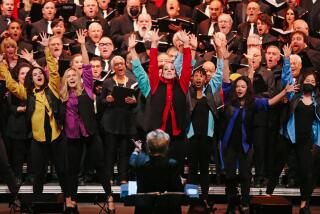Concert to Feature Music of Paradise Ghetto
The first time composer Nick Strimple heard the music from the city called Paradise Ghetto by the Nazis, he couldn’t shake the feeling it gave him.
Although he is neither Czech or Jewish, the composer and conductor found the music from Terezin gripping and “emotionally very intense,” he said. On Thursday, Strimple will direct members of the Choral Society of Southern California in a concert of choral and chamber music from the Czech city.
Terezin was an unlikely breeding ground for the music, poetry and art that were created there during World War II, Strimple said. The Nazis moved the city’s 4,000 inhabitants out of Terezin in 1941 and moved in 40,000 Jews, mainly from Czechoslovakia, the Netherlands and Denmark.
Many of the leading cultural figures in Czechoslovakia were Jews, Strimple said. Among those sent to Terezin were Czechoslovakia’s composers, opera singers and orchestral musicians. Less than two months after their forced resettlement in Terezin, they held their first concert on Dec. 6, 1941.
The Nazis permitted the concerts to continue in the city they called the Paradise Ghetto because they wanted to fool the world into thinking that they were resettling Jews into their own community, Strimple said. Most of the musicians were held there three years until they were sent to their deaths in Auschwitz or freed when the city was liberated in 1945, he said.
Composer Gideon Klein, whose chamber music will be performed in the concert, chose to go with his parents, who were taken on the last train to Auschwitz, Strimple said. Klein died in a work camp while his sister, who stayed behind in Terezin, was freed when the city was liberated.
Composer Pavel Haas, whose choral works will be performed, died in the gas chambers at Auschwitz. His daughter and his non-Jewish wife, whom he had divorced to protect, survived the war.
The music of Terezin is “emotionally very intense, but it doesn’t have a feeling of despondency,” Strimple said. “It has moments of anger and homesickness but it is never the music of someone who has given up. It is eager to communicate and speaks to the human condition.”
The concert on Thursday at the University of Judaism will feature works by Haas and Klein for chorus, piano and strings. Performers will include members from the Choral Society of Southern California, which Strimple established in 1982 to foster an appreciation for unrecognized masterworks. The evening also will include children’s poetry from Terezin read by actress Linda Lavin, and art painted in the walled city will be on display.
The concert honors the memory of Terezin and is a benefit for the Martyrs Memorial and Museum of the Holocaust in Los Angeles, said Lillian Goldman, chairwoman for the event. The evening is titled “Singing in the Lion’s Mouth” because “here they were in a concentration camp and still able to compose and write poetry and have a cultural life,” Goldman said.
The museum was founded in 1978 by survivors of Nazi concentration camps to commemorate and create an awareness about the Holocaust, she said. But the museum doesn’t dwell on the morbid.
“It is truly educational,” Goldman said. Busloads of children from every denomination visit to learn about the home and synagogue of that period from docents, many of whom are survivors of the Holocaust. The museum displays replicas of camps, original documents from Nazi Germany and more than 70 paintings from Terezin.
“Singing in the Lion’s Mouth” begins at 8 p.m. Thursday in the Gindi Auditorium, University of Judaism, 15600 Mulholland Drive, West Los Angeles. Tickets are $18 and $30, or $250 to become a sponsor. For tickets and information, call the museum , (213) 651-3175 or the Jewish Federation Council, (213) 852-1234.
More to Read
The biggest entertainment stories
Get our big stories about Hollywood, film, television, music, arts, culture and more right in your inbox as soon as they publish.
You may occasionally receive promotional content from the Los Angeles Times.










